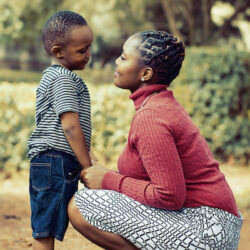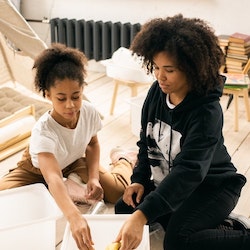“Dad.” “Daaad.” “Daaaaaaad!!!” All day. Every day. Yep, this is the new soundtrack of my life, and probably many of yours. My home office (my bedroom) is part workspace, part maze of paper stacks, and part homeschool. It’s crazy.
I have two kids, ages 10 and 12. I’m not proud to admit that more than once a day during the lockdown I want to bonk their heads together like the Three Stooges. Obviously, I don’t, but when the stay-at-home orders started, it was a shock to all our systems. Those first few weeks were a seemingly never-ending stream of neediness. I have a feeling I wasn’t alone.
My academic research and my work in schools have led me back to the same understanding about the immense importance of lessons learned outside of the classroom, the lessons we all want our kids to learn in order for them to have the brightest futures (and not live in the basement when they are 25). It can be summed up by something Michelle Obama said:
“The mother that I am today is a direct result of Marian Robinson. The thing she always said that I remember is that, she told me and my brothers, ‘I wasn’t raising children, I was raising adults.’”
It may seem counterintuitive, but now is the right time to get focused on raising adults, especially because we are in these strange times. Adult skills include not only independence but also responsibility and helpfulness. Here are a few ideas to try out that can build up your child’s ‘adult skills.
Model New Behaviors
“Daaad, can I have water?” (obviously in a somewhat whiny voice). This one seems to be playing on a loop in our house. Slightly annoyed and without thinking, I jump up and get the water. But I started to think about why I was doing a task that they could so clearly do themselves. The reason, I realized, was just so they wouldn’t keep interrupting me while I worked. A quick fix for sure, but one that guarantees I will be doing it all through the day. So I started a new approach. The next time I got the “Can I have water?” question, my answer was simple: “Yes,” I said. The first time, I got a blank stare back and neither of us moved. When pressed, my response was, “Of course you can have water. You know where the cups are.”
It worked! It turns out my kids can actually get a cup, turn on the faucet, fill their cup, and drink! All by themselves. I have genius kids.
Set “Alone” Times and Let Kids Be Bored
“I’m booored.” (also whiny). If I never hear this again I might achieve nirvana. Boredom is something kids often complain about and that parents often reflexively try to fix. While in lockdown, it’s like a mantra for my kids. They chant it as if I’m the anti-boredom deity. It makes me want to pull out my hair (which, of course, is in desperate need of a haircut).
article continues after advertisement
But is boredom so bad? A 2019 study, and many before that, suggested that boredom may spark an increase in imagination and ingenuity. Kids should be encouraged to make up a way to play or find another activity to do. In order for kids to get the Brain Benefits of Boredom, don’t rush in with a solution. This creates space for your child to come up with their own solution. It might not happen the first or second time, but it’s worth the payoff if you stick to it. It can also set boundaries for parents to have their own time to breathe or work, and it lets kids know that even though you’re in the house, you aren’t available to meet all their needs every second of the day.
Experiment With Bedtime
Bedtime. The thought of it makes me shudder. Honestly, by 9 p.m. I just want to get in bed with a book or zone out in front of the TV. Bedtime is definitely a nice quiet time to connect with your kids, but it can feel interminable. If you’ve nagged, cajoled, or even yelled a little bit as you try to get your kids to sleep, you are not alone. With older school-age kids, bedtime can be a responsibility-generating opportunity. Anecdotally, families are staying up later and sleeping in more during the coronavirus. This is an excellent chance to try out some things that can lead to independence around going to bed. On their own, kids can get into pajamas, brush teeth, pick a book, and even decide when to turn off their light. It is extremely empowering for a child to be able to read in bed and choose when to go to sleep. This is a particularly good time to experiment because our mornings aren’t the usual rush to get out of the house.
It May Take Some Time
Difficult situations are fantastic opportunities to enhance our coping ability and resilience. The psychiatrist Regina Pally often suggests that we ‘reframe the difficulty’ into something positive. For example, it could be an opportunity to discover a new strength or to learn a new skill. COVID-19 is a difficult situation for us all. But it can be used as an opportunity to help cultivate responsibility and independence in our kids. And as an added benefit, it might help create a greater sense of family togetherness and help grow some new parenting strengths. Learning new ways to engage with our kids and for our kids to learn new ways to behave can take time. The point is to keep trying. Be patient. Stick with it. If you keep it up, eventually you’ll start to see some success.



